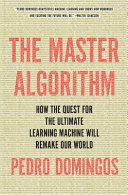

In 'The Master Algorithm', Pedro Domingos presents a comprehensive exploration of machine learning, a field that is rapidly transforming our world. The book is structured around the central idea of a 'Master Algorithm', ...
Continue readingIn 'The Master Algorithm', Pedro Domingos introduces the idea of a unifying algorithm that can learn from data and improve over time. This concept reflects the ambition to create a single algorithm that can solve any lea...
Continue readingDomingos identifies five distinct schools of thought in machine learning, referred to as 'tribes'. These are: Symbolists, Connectionists, Evolutionaries, Bayesians, and Analogizers. Each tribe has its own approach to lea...
Continue readingA central theme in 'The Master Algorithm' is the critical role that data plays in machine learning. Domingos emphasizes that data is the fuel that powers algorithms. The quality and quantity of data directly impact the p...
Continue readingDomingos explores the societal implications of algorithms, particularly as they become more integrated into daily life. He argues that algorithms are not neutral; they can reflect and amplify biases present in the data t...
Continue readingIn 'The Master Algorithm', Domingos offers insights into the future landscape of machine learning and artificial intelligence. He posits that the quest for the Master Algorithm will drive innovation and research in the c...
Continue readingDomingos stresses the importance of interdisciplinary collaboration in advancing machine learning research and applications. He argues that the challenges posed by machine learning are not solely technical; they involve ...
Continue readingThe final key idea in 'The Master Algorithm' is the democratization of machine learning. Domingos highlights the trend of making machine learning tools and resources more accessible to a broader audience, including non-e...
Continue readingThe reading time for The Master Algorithm depends on the reader's pace. However, this concise book summary covers the 7 key ideas from The Master Algorithm, allowing you to quickly understand the main concepts, insights, and practical applications in around 26 min.
The Master Algorithm is definitely worth reading. The book covers essential topics including The Concept of the Master Algorithm, The Five Tribes of Machine Learning, The Importance of Data, providing practical insights and actionable advice. Whether you read the full book or our concise summary, The Master Algorithm delivers valuable knowledge that can help you improve your understanding and apply these concepts in your personal or professional life.
The Master Algorithm was written by Pedro Domingos.
If you enjoyed The Master Algorithm by Pedro Domingos and want to explore similar topics or deepen your understanding, we highly recommend these related book summaries:
These books cover related themes, complementary concepts, and will help you build upon the knowledge gained from The Master Algorithm. Each of these summaries provides concise insights that can further enhance your understanding and practical application of the ideas presented in The Master Algorithm.